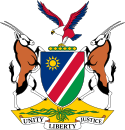
Politics of Namibia takes place in a framework of a semi-presidential representative democratic republic, whereby the President of Namibia is both head of state and head of government, and of a pluriform multi-party system. Executive power is exercised by both the president and the government. Legislative power is vested in the two chambers of Parliament. The judiciary is independent of the executive and the legislature.
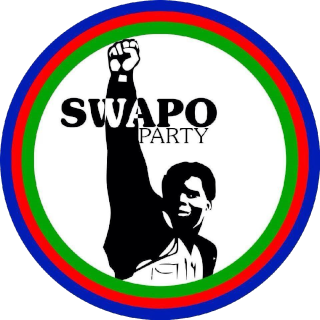
The South West Africa People's Organisation, officially known as the SWAPO Party of Namibia, is a political party and former independence movement in Namibia. Founded in 1960, it has been the governing party in Namibia since the country achieved independence in 1990. The party continues to be dominated in number and influence by the Ovambo ethnic group.

Samuel Shafiishuna Daniel Nujoma, is a Namibian revolutionary, anti-apartheid activist and politician who served three terms as the first President of Namibia, from 1990 to 2005. Nujoma was a founding member and the first president of the South West Africa People's Organization (SWAPO) in 1960. Before 1960, SWAPO was known as the Ovambo People's Organisation (OPO). He played an important role as leader of the national liberation movement in campaigning for Namibia's political independence from South African rule. He established the People's Liberation Army of Namibia (PLAN) in 1962 and launched a guerrilla war against the apartheid government of South Africa in August 1966 at Omugulugwombashe, beginning after the United Nations withdrew the mandate for South Africa to govern the territory. Nujoma led SWAPO during the lengthy Namibian War of Independence, which lasted from 1966 to 1989.

Theo-Ben Gurirab was a Namibian politician who served in various senior government positions. He served as the second prime minister of Namibia from 28 August 2002 to 20 March 2005, following the demotion and subsequent resignation of Hage Geingob. Previously he was the country's first Minister of Foreign Affairs from 1990 to 2002 and was President of the United Nations General Assembly from 1999 to 2000. He was Speaker of the National Assembly of Namibia from 2005 to 2015, when he was replaced by Peter Katjavivi. Gurirab ultimately resigned from politics in 2015.

Hifikepunye Lucas Pohamba is a Namibian politician who served as the second president of Namibia from 21 March 2005 to 21 March 2015. He won the 2004 presidential election overwhelmingly as the candidate of SWAPO and was reelected in 2009. Pohamba was the president of SWAPO from 2007 until his retirement in 2015. He is a recipient of the Ibrahim Prize.
Ben Ulenga is a Namibian trade unionist, politician, and diplomat. In the 1990s, he served under the SWAPO government as a deputy minister and as an ambassador, but he left SWAPO in 1998 and founded an opposition party, the Congress of Democrats (CoD), in 1999. He was a member of the National Assembly of Namibia from 2000 to 2015 and led the CoD until 2015.
Tsudao Immanuel Gurirab is a Namibian politician. A member of Congress of Democrats (CoD), Gurirab was previously a member of the ruling South West Africa People's Organization (SWAPO) until he alongside Ben Ulenga, Ignatius Shixwameni and others left SWAPO to form CoD in 1999. He was also a member of the Pan-African Parliament and the only non-SWAPO member selected from Namibia. In 2007, Gurirab was elected chairperson of the party.

Albert Mishake Muyongo is a Namibian politician and former Member of Parliament who is currently living in exile in Denmark.
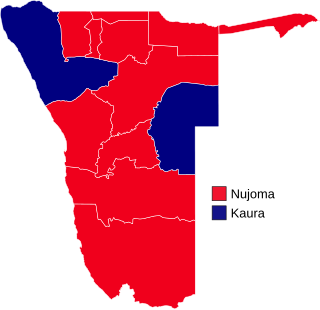
General elections were held in Namibia on 30 November and 1 December 1999 to elect a president and the National Assembly. Voting took place over two days, after the Commission was persuaded by protests from political parties that a single polling day would be insufficient to accommodate travel to polling stations by voters in remote areas.
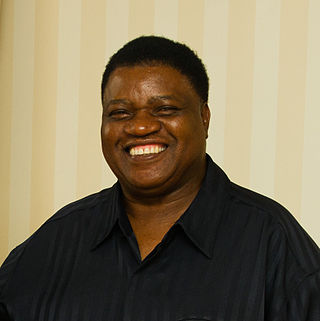
Utoni Daniel Nujoma is a Namibian politician who has served as Minister of Labour, Industrial Relations and Employment Creation since March 2020. He has served in various government ministerial positions in the government since 2010.
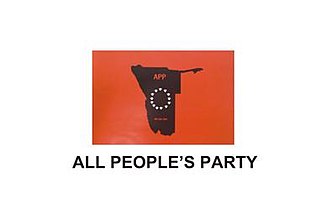
The All People's Party (APP) is a political party in Namibia.
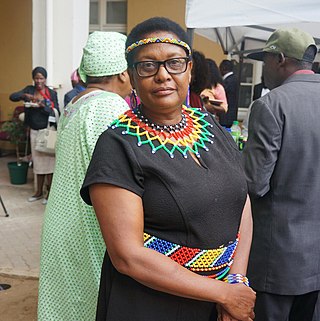
Elma Jane Dienda is a Namibian politician and teacher. Currently a member Democratic Turnhalle Alliance which she joined four years after she resigned from the CoD, Dienda was a member of the National Assembly of Namibia from taking the CoD's final spot in 2004 until the CoD did not receive enough votes for her re-election in 2009. She is of South African and Malawian descent.
Jesaya Nyamu is a Namibian politician. A member of the Rally for Democracy and Progress (RDP), he was a high level member of the South West Africa People's Organization (SWAPO) from 1964, when he fled into exile, until 2002, when he was expelled from the party for "disobedience". He was a member of SWAPO's central committee from 1975 until his expulsion from the party in 2002. In 2007, he registered a new political party, the Rally for Democracy and Progress (RDP) and was unanimously selected as the party's secretary general in 2008. He was elected to the National Assembly of Namibia with RDP in the 2009 general election.
Nora Schimming-Chase was a Namibian politician and Namibia's first ambassador to Germany from 1992 to 1996. After changing her party membership from South West Africa National Union (SWANU) to Congress of Democrats (CoD), Schimming-Chase became a member of the National Assembly of Namibia from 2000 to 2010.

General elections were held in Namibia on 28 November 2014, although early voting took place in foreign polling stations and for seagoing personnel on 14 November. The elections were the first on the African continent to use electronic voting.
Pauline Frannzisca Dempers is a Namibian human rights activist and politician. In 1996, Dempers became national coordinator for Breaking the Wall of Silence (BWS), a group which advocates for the rights of those detained by SWAPO during the Namibian War of Independence. Dempers was active with the Congress of Democrats.
Visolela Rosalinda "Rosa" Namises, nicknamed the "Rosa Luxemburg of Namibia", is a Namibian politician, human-rights activist and chief of a faction of the ǀKhomanin, a clan of the Damara people. She is a former member of Parliament and founding member and former secretary-general of the Namibian Congress of Democrats (CoD). A prominent voice on gender issues, human-rights violations, and violence against women and children in Namibia, she is the director of Woman Solidarity Namibia and works at the Dolam Residential Child Care centre, a day-care centre for vulnerable children.

